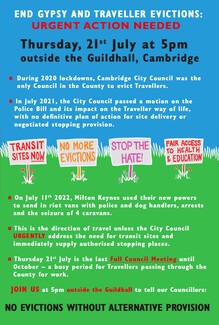No to Traveller evictions and yes to more sites – say Cambridge activists
Protestors demand Cambridge City Council stop evicting Gypsy and Traveller communities and that they deliver transit and permanent sites
Protestors gathered outside the Guildhall on Thursday 21 July 2022 before the Full Council Meeting to demand that Cambridge City Council take urgent action to provide a transit site and negotiated stopping agreements in order to safeguard nomadic Gypsies and Travellers from over-policing and criminal prosecution under the Police, Crime Sentencing and Courts Act (PCSC Act).
In 2020, Cambridge City Council was the only Local Authority in Cambridge to evict Travellers during the first Covid lockdown, against government advice.
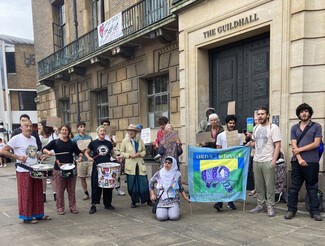
Cambridge is an important stopping place for Gypsies and Travellers for work, to visit family and to attend the 800-year royal chartered Midsummer Fair, the first of the seasonal celebrations of Gypsy and Traveller culture. However, there are numerous reports of Gypsies and Travellers experiencing discrimination on the day, including many facilities not being open to attendees (reportedly as a result of advice from the police).
Over the past two years, the Cambridge Gypsy, Roma & Traveller Solidarity Network have challenged Cambridge City Council over their failure to provide either transit sites or negotiated stopping places in the city. In 2021, the City Council passed a motion on the Police Bill and its impact on the Traveller way of life, with no definitive plan of site delivery, in the context of ongoing evictions and no permanent or transit sites in the city at all.
We warned that the Bill would pass because of the Tory majority and stressed the urgency of finding solutions before it came into effect. Despite their July 2021 motion in recognition of the threat to the Gypsy and Traveller way of life, the City Council has continued to evict Gypsies and Travellers, and would not agree to an emergency eviction moratorium in response to the passing of the PCSC Act.
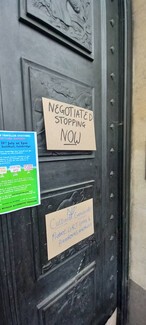
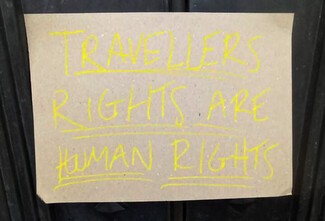
On June 28th, new powers in the PCSC Act came into force, redefining 'trespass with the intent to reside' as an imprisonable offence, and allowing police to seize vehicles from those suspected of it, effectively criminalising nomadic life in England and Wales, which advocacy groups have described as an attempt to eradicate their traditional culture.
On July 11th, Milton Keynes used their new powers to send in riot vans with police and dog handlers, arrests and the seizure of four caravans, potentially making people homeless.
Mahoney Goodman, a member of Cambridge Gypsy, Roma and Traveller Solidarity Network, said: "We are protesting today because Cambridge City Council's next full meeting is in October, and the Summer period is the busiest time for Travellers to pass through Cambridge seeking work. The risk that a situation like the one in Milton Keynes could happen here is unacceptable."
Cambridge Gypsy, Roma and Traveller Solidarity Campaign feel that the Council has put over-reliance on the delayed Gypsy & Traveller Accommodation Needs Assessment (GTANA) to assess need. This has been further complicated by the revised planning policy in August 2015 which modified the definition of Gypsies and Travellers. The needs assessment by the private company ORS in 2016 only spoke to a small proportion of Gypsies and Travellers in Cambridge City and South Cambridgeshire, and concluded that there was only one Traveller family living in Cambridge requiring appropriate accommodation. The report by current company RRR has been delayed for over a year and counting.
At the previous Full Council meeting in May 2022, the administration at Cambridge City Council committed to creating a site but it is unclear whether this is a Temporary or Permanent site, or where and when provision will be provided. After the peaceful protest outside the Guildhall, GRT Solidarity Network put two public questions to the 21st July meeting. The concerns expressed were the timing of provision in the face of the PCSC Act and the unsettling example of Milton Keynes, which could be the direction of travel if alternate provision is not supplied. The lack of urgency by the Council as Traveller communities are in the front line, threatened by seizure of vehicles/homes, debt, imprisonment, and their children taken into care, is insupportable.
The GRT Solidarity Network will continue to press the Council to meet its obligations and hold them accountable until they end evictions and provide alternate legal solutions.
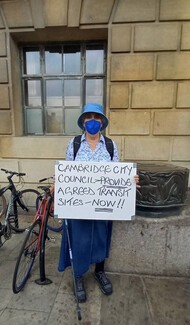
By Cambridge GRT Solidarity Network/TT News
(Lead picture: Unauthorised encampment on Coldhams Common, August 2020. Credit Oblique Arts)
